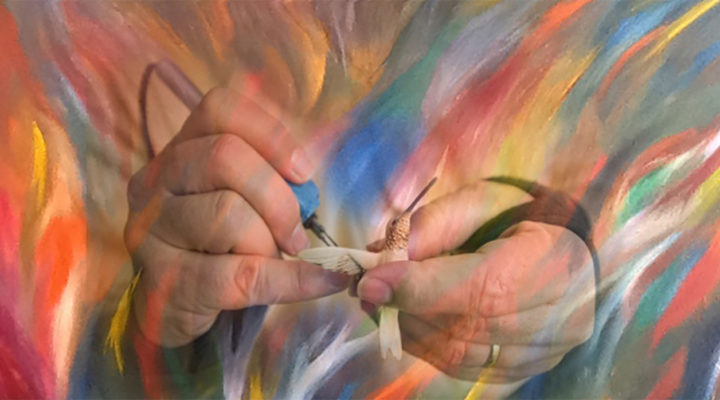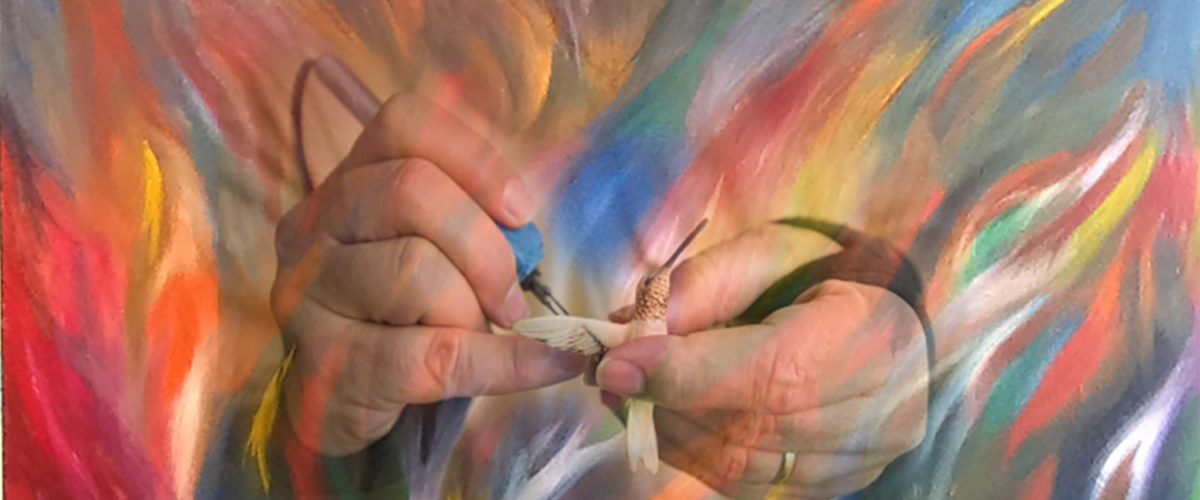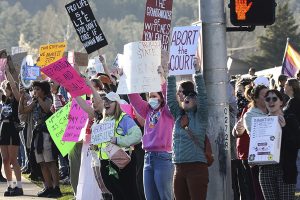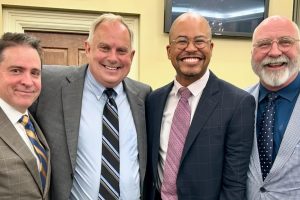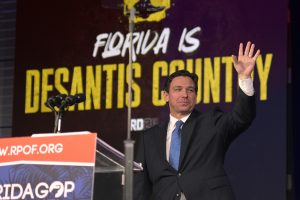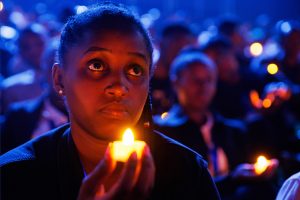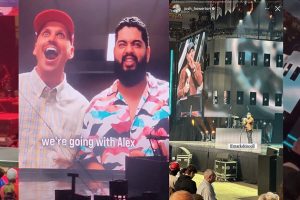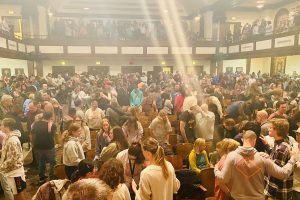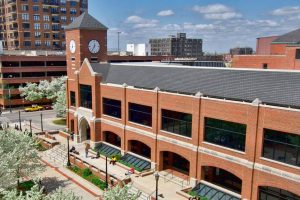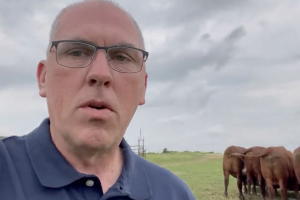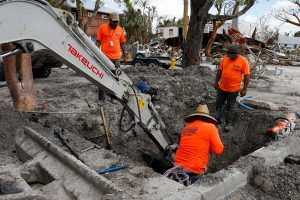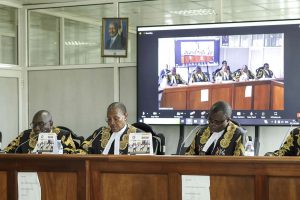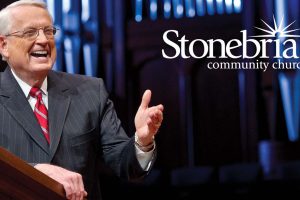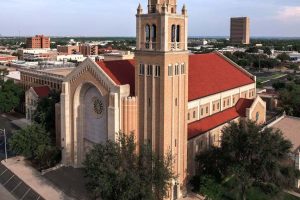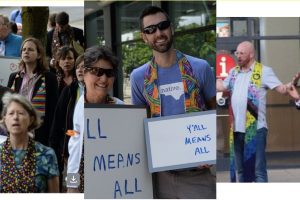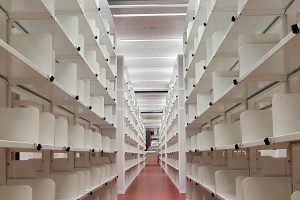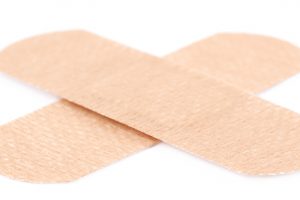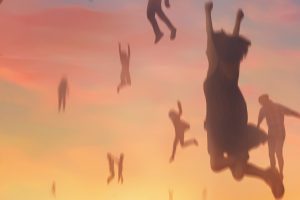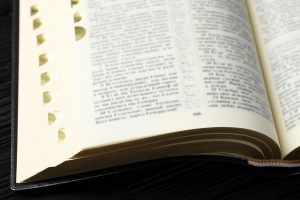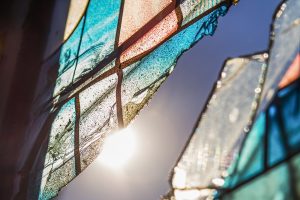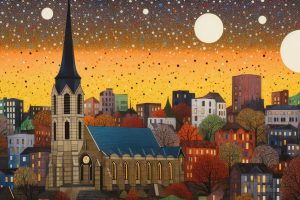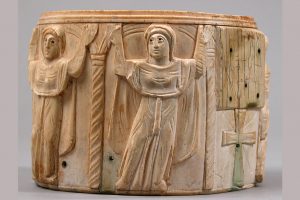Former minister now ‘prisoner to pain,’ but art ‘transports’ him to place of purpose.
Almost by accident, Kerry Smith has become a popular artist — a sculptor, painter and woodcarver. But he hasn’t done it alone. His constant companion — and a most unwelcome one — is chronic pain.
Have you ever had a “friend” you wish you could get rid of — the kind that nags, imposes and distracts you from the important things? That’s the relationship Smith has had throughout his 15-year career with chronic pain in his lower back, hips, legs, neck, wrists and almost anywhere else it chooses to show up.
 The minister-turned-artist would much rather be left alone to carve the exquisite, life-like wooden ducks that once brought him pleasure and profit. But he doesn’t have a choice. So instead the Memphis, Tenn., artist incorporates his unrelenting pain into his art to carve something redemptive out of his disability.
The minister-turned-artist would much rather be left alone to carve the exquisite, life-like wooden ducks that once brought him pleasure and profit. But he doesn’t have a choice. So instead the Memphis, Tenn., artist incorporates his unrelenting pain into his art to carve something redemptive out of his disability.
“My art gives me a place to go, even when I’m in pain, to put myself in another world — I see it as a sanctuary,” says Smith, 54, a former Baptist church planter, pastor and campus minister.
Creative expression is both an escape from his pain and an inescapable part of it, Smith says. Pain doesn’t so much inspire his work as indwell each piece.
On his website he explains how particular works reflect or express his struggle with pain. Several of his favorite works grew out of crises in that battle. And other times the residue of his pain lies beneath the surface, in the delicate details of duck’s feathers or the minute, repetitious strokes of his knife.
Like many chronic pain sufferers, Smith knows he won’t be cured. Fifteen years of countless medical treatments have not made his pain even bearable. He wakes up every morning at war with his own body. He has accepted that he will never have another pain-free day. And he’ll likely never be able to make a living again doing what he loves — sculpting and woodcarving.
But Smith isn’t looking for sympathy, suggestions or preferential treatment. It would be enough if people believed him when he says he’s in excruciating pain. It would be even better if they understood. But unless someone has been in chronic pain for years, that’s difficult to impossible.
Warning: This is not another story about a Christian “overcoming adversity.” That’s a theme we like to read about — people who conquer limitations to find success, a cure or at least a positive future. But that’s not Kerry Smith’s story.
His story is about what happens when the cure doesn’t come, the miracle you pray for never happens, and recovery becomes a discarded illusion. It’s about living with grace within the disability, about making your peace with pain.
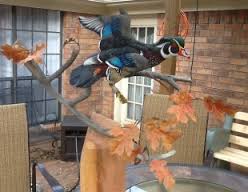 Smith taps into his pain to draw something different out of his disability.
Smith taps into his pain to draw something different out of his disability.
“I long to create beauty out of the ugliness I have been given, I really do,” he says. In a sense, the beauty he creates is the “beauty,” or completeness, his body lacks. “I’d give my right [arm] to be able to exist in my most beautiful form.”
Smith’s torso is a moonscape, pocked with scars from 11 spine surgeries. It started innocently enough in December 2001. While lifting the family Christmas tree onto the top of the minivan, he felt his back “give out.” It turned out the 40-year-old had ruptured a lumbar disc. He had his first spinal surgery, which worked but only for awhile.
Back surgery is seldom a true “fix” and never a cure. In most cases, it’s an accommodation. If the cause is degenerative, as in Smith’s case, one back surgery often leads to three or four, and each one can leave behind scar tissue and nerve damage that over time become their own source of pain.
Underneath the skin of his lower back, titanium screws and rods hold together the parts of his lumbar spine that no longer move. Another scar under his chin denotes his cervical fusion, which limits his neck movement and some of his pain. A scar on his side marks where a spinal-cord neuro-stimulator was implanted — and later removed because it didn’t work.
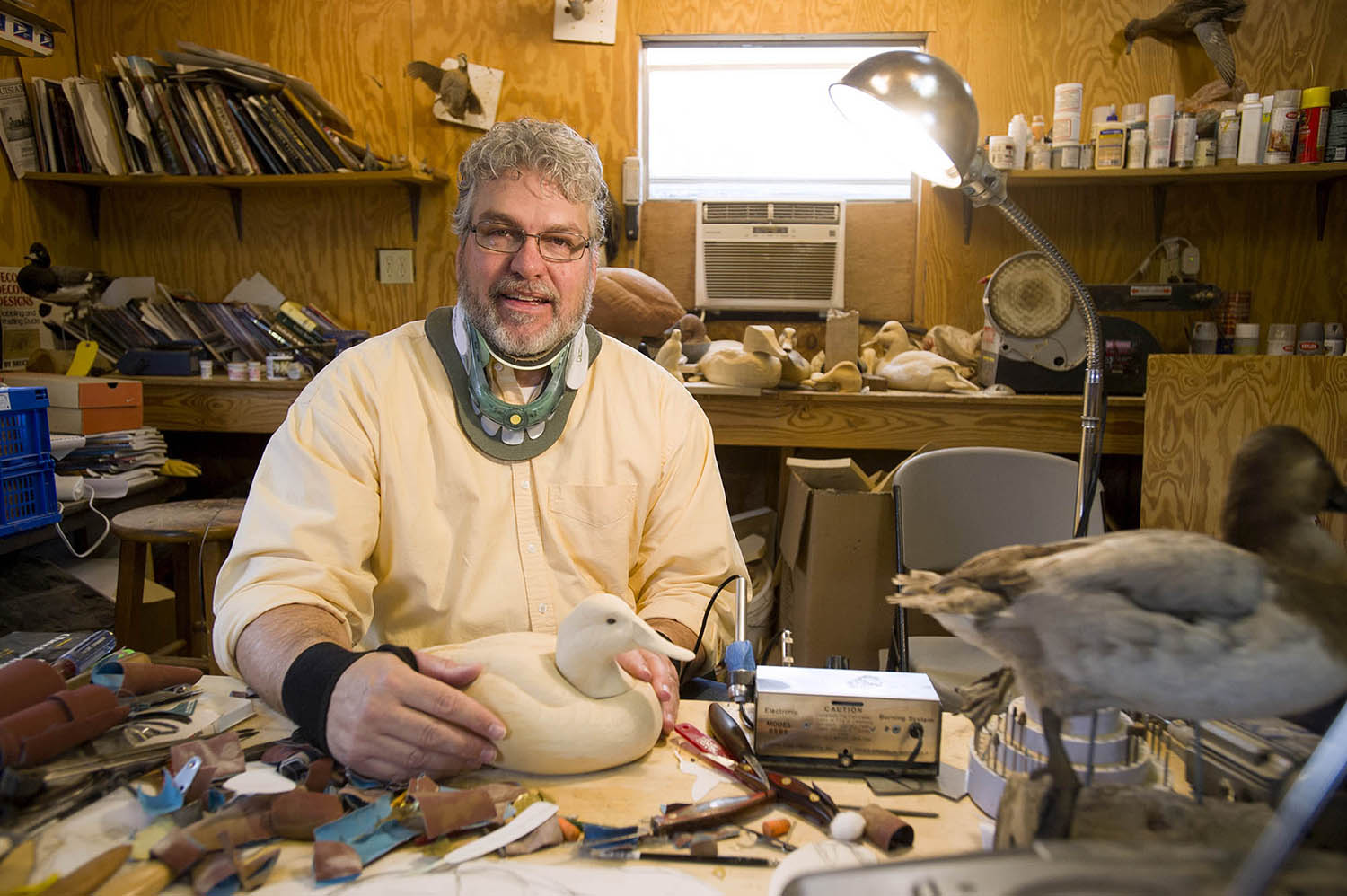
Kerry Smith poses in his woodworking shop behind his Bartlett home. Smith wears braces on his neck, back and wrists to help alleviate his chronic pain. Smith has undergone 21 neurological surgeries and procedures including multiple cervical and lumbar fusions to his spine. He also suffers from arthritis and carpal tunnel syndrome. Smith advocates on behalf of chronic pain sufferers who fear new CDC regulations which could restrict patient access to opioid medications prescribed for pain relief. (Brandon Dill/Special to The Commercial Appeal)
Smith learned to push through the pain and continued to work. But in 2003 he lost his fulltime position as a denominational church planter, he says because of his back injury.
So he reinvented himself, reviving a lifelong love of art. A friend turned him on to woodcarving and he found he had a real gift for carving and painting intricate, realistic wooden ducks out of tupelo wood or basswood.
He sold some ducks, got orders for more, even was commissioned for some large sculptures. He discovered he was good enough to make a second career. With his earnings he helped pay for Karen, his wife of 32 years, to return to school and become a campus minister, which replaced some of his lost income.
In all Smith has had 21 spinal procedures — 15 surgeries, multiple nerve blocks and other spine treatments. Some have worked, others haven’t. He declined to have five other recommended surgeries.
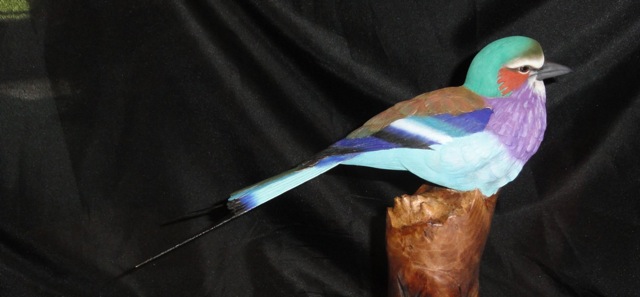 His new vocation flourished, bringing in awards and money. Smith has completed about 75 carvings in his career — mostly birds — including song birds, water birds, shore birds, birds of prey, and more than a dozen kinds of ducks. Each duck takes about five months to complete — less time for a songbird, more for a bird of prey.
His new vocation flourished, bringing in awards and money. Smith has completed about 75 carvings in his career — mostly birds — including song birds, water birds, shore birds, birds of prey, and more than a dozen kinds of ducks. Each duck takes about five months to complete — less time for a songbird, more for a bird of prey.
He begins with an exhaustive study of the anatomy and coloring of his birds. He then “roughs out” the bird with saw, chisel and knife, sands it to a perfect 600-grit smoothness, and “burns” the details of the feathers with a pyrographic pen. To create each color — typically 60 per duck — he applies a coat of oil paint, then wipes it off and repeats the process three times, to slowly “stain” the colors into the wood.
He has received as much as $9,500 for one canvasback duck. But his most profitable carving was of a red-tailed hawk that earned him $25,000.
Kerry Smith’s story might be one of “overcoming” if it had been written before 2008. But when the economy tanked that year, people didn’t have money to commission artwork. Some orders were canceled and new ones quit coming in. But even as the economy sank, Smith’s pain spiked. His back and neck pain got worse and, after years of meticulous carving, he developed carpel tunnel syndrome, requiring surgery on both wrists.
By 2014 he was on permanent disability.
Much of the evidence of Smith’s battle with pain is unseen — the sporadic nerve pain running through his hip and leg, the loss of circulation in his feet, restless leg syndrome, and mental exhaustion and depression.
A permanent fog shrouds his thinking. It’s a classic Catch 22 — chronic pain can cause difficulty concentrating and loss of short-term memory, but so can long-term use of opioids to control that pain.
At one of his lowest times, as Smith went in for his second carpel tunnel surgery in 2012, he was overwhelmed with a sense of loss. After a loss of income, loss of purpose and loss of favorite activities, “I couldn’t see where I was going. I was just plain lost.”
Crying and filled with dread, he had a panic attack in the pre-op area. But the surgery was successful, and in recovery afterward he had a deeply spiritual experience.
“I was talking to Karen and suddenly I left. It was not out-of-body. I was talking to Karen the whole time, but I was gone. I stood in a field of multicolored grass, and I had an immense feeling of loneliness and fear. All of a sudden, God came to me, took my hand and started walking with me. Immediately I came back and told Karen, ‘I’ve just seen God.’”
“Later I tried to paint God, but it didn’t work. Karen said, ‘Why don’t you paint what you saw?’ So I did — a field of colors as vivid as I have ever seen.”
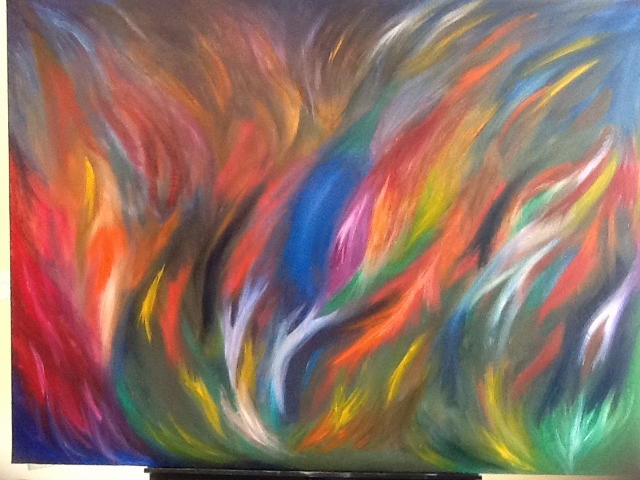 The result is one of his favorite works, a painting called “Found!”
The result is one of his favorite works, a painting called “Found!”
“This painting for me is an anchor,” he wrote recently, after another unsuccessful procedure on his cervical spine. “It holds me fast in my times of question and doubt. It reminds me of my experience with God and to know that, in the midst of whatever it is that happens to any of us, God promises to walk with us and to never leave us.”
At other times, Smith feels “lost” but in a good way.
The meticulous nature of woodcarving allows him to lose himself in his work. “I will spend time focusing on how feathers lay, how you find the color beneath them, how to get a bird to turn a certain way [to reveal a certain feature].”
In this sense, his art becomes a spiritual discipline that helps him cope with pain. “It allows me to go into a different place.” It’s not healing, but it is “transformational,” he says. “It makes you somebody that you weren’t before.”
Sculpting and painting, like the meditation he practices every morning, focuses his mind on something other than the pain that wracks his body. Being “transported” — living above the pain, if only for a while — can be as effective as the Oxycontin narcotic pills he takes three times a day.
At this point in his career, Smith measures success not by completing a work but “just being lost in it.” For that reason, he would carve, paint and sculpt even if he weren’t good at it.
Woodcarving is essentially a craft that can be learned by mastering certain techniques, Smith says. “But to take that craft and transform it to an art form is a spiritual experience that melds the mind with the hand.”
Early in his career he was primarily a craftsman, but “as the marks of life have left their imprint on my soul, it is the spirit that moves my art to new places.”
His inspiration comes from the love of his family, the outdoors, hunting, birds in flight and simply “living life” — the big events that mark turning points or the messy, mundane stuff that fills each day.
As his pain has increased, it has become harder to disconnect from it and get lost in the work, he admits. “I can’t get into that zone like I used to.”
These days his work ritual begins with the hardest part — getting out of bed.
“With pain often shooting down each leg with every step, I struggle to stand after waking each day, often grabbing the door-facing for balance,” he wrote recently on a web forum for chronic pain patients. “Each breath and every heartbeat shoots a signal to my brain that I am not at my best because I am broken.”
When Smith feels well enough to work, after his coffee and meditation, he makes his way to a small studio behind their house in northeast Memphis. Here sits a well-lit workbench surrounded by the tools of his trade — bird books, knives and bits, paints and brushes, a couple of hefty power tools, and numerous wooden ducks in various stages of production.
But equally important is what he wears to be able to work — a back brace, an immobilizing collar for his neck, and wraps on both wrists.
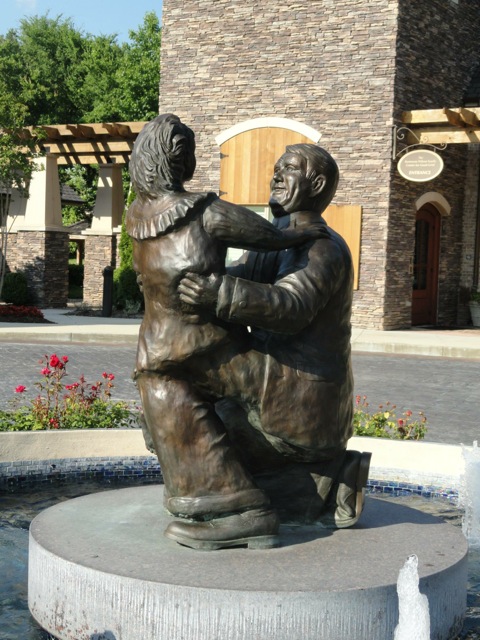 Smith likens chronic pain patients to prisoners. “They are bound by a body that no longer works as it once did, and they are prisoners inside of that jail cell.”
Smith likens chronic pain patients to prisoners. “They are bound by a body that no longer works as it once did, and they are prisoners inside of that jail cell.”
Pain is bad enough, but when it becomes unrelenting and inescapable — when there is no cure and no relief — the feelings of desperation often cause depression, anxiety and hopelessness, doctors say.
A terminal illness is arguably worse, but at least the patient knows there is an end to the pain. It’s not surprising that chronic pain patients are up to twice as likely to commit suicide, according to several studies.
With his body at its worst, Smith himself came to that point last year. Overwhelmed with thoughts of all he had lost and missed, he lay despondent on his bed one afternoon when Karen found him.
For more than a decade, Karen also had lived with pain as the “invasive” companion in their relationship, he recalls, “and loneliness [had] crept in to become an unwelcome friend to both of us.” But Smith adds, “She has learned to read me now after all of these years and she was spot on.”
“Are you suicidal?” she asked.
With Karen’s help, he was able to turn his mind to what he had left, what he still offered, and who still valued him. “The pieces of Kerry Smith were worth more to my people and to my world, and maybe to my God, than none of Kerry Smith,” he wrote later.
Smith knows his artwork has the power to transform not only himself but others, especially those in pain. One of his favorite works is not a duck but a bronze statue and fountain called “Embracing the Journey,” commissioned for the Baptist Hospice House and Center for Good Grief. “I know that piece of art has had an impact on people,” he says.
The life-sized statue depicts Kemmons Wilson, a benefactor of the hospice, welcoming his great-granddaughter into his arms. The message for those facing the pain of death, Smith says: “At life’s end, God sits us on his lap and says ‘Welcome!’”
For people in chronic pain, Smith’s advice is to find your way to express yourself, who you are, and what you feel.
He saw the power of expression in a stroke patient named Warner Smylie. Although immobilized on the left side of his body, Smylie insisted, “I would give anything if I could learn to carve.”
“I taught him three times a week,” Smith recalls. “I would hold a piece of wood for him, and he would carve.” Smylie’s dexterity with a carving knife was less than steady. “It would scare the crap out of me. But he would just bawl his eyes out while we were carving, just to be able to do that.”
With a lot of help from Smith, Smylie carved three rudimentary birds that he gave to his three sons for Christmas. “They loved it!” Smith says. For Smylie, the experience “didn’t make his body better, but it did change his life.”
Those who suffer have much to teach others, says Smith, returning to a favorite theme. He compares those in chronic pain to the “broken clay pots” described in the biblical books of Jeremiah and Romans.
“Inside of that broken vessel is something worth redeeming. We who are broken have something important to say about who God is, [something] that we couldn’t say about God if we weren’t broken.”
— This article was first published in the Summer 2016 issue of Herald, BNG’s magazine sent five times a year to donors to the Annual Fund. Bulk copies are also mailed to BNG’s Church Champion congregations.

